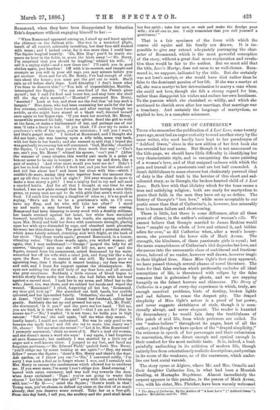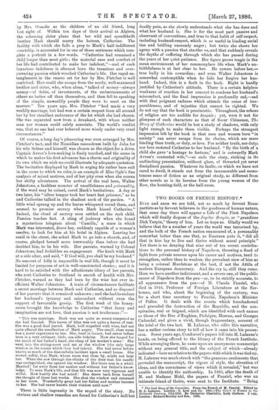THE STORY OF CATHERINE.*
THOSE who remember the publication of A Lost Love, some twenty years ago, must feel an eager curiosity to read another story by the
same writer, who need hardly have kept to her pseudonym of "Ashford Owen," since in the new edition of her first book she has revealed her real name. But though it is not announced on the title-page, we should have little difficulty in identifying her very characteristic style, and in recognising the same painting of a woman's love, and of that resigned sadness with which the pain and travail of a passionate soul are but half concealed. A dumb faithfulness to some obscure but obstinately pursued ideal of duty is the chief trait in the heroine of this short and sad- coloured story, as in Georgie, the broken-hearted child of A Lost Love. Both love with that idolatry which for the time seems a true and satisfying religion ; both are ready for martyrdom to prove their faith in the men they have set up as deities. The history of Georgie's " lost love," while more acceptable to our poetic sense than that of Catherine's, is, however, less miserably true to human failure and shortcoming.
There is little, but there is some difference, after all these years of silence, in the author's estimate of woman's role. We cannot believe that Georgie married to James Erskine would have " caught up the whole of love and uttered it, and bidden adieu for ever," as did Catherine when, after a week's honey- moon, she perceived the lower side of Mark Avron. The strength, the blindness, of these passionate girls is equal ; but the mean scampishness of Catherine's idol degrades her love, and she passes into the unromantic class of embittered and fractious wives, beloved of no reader, however well drawn, however tragic in their blighted lives. Since Miss Ogle's first story appeared, we have passed through several phases of novel literature. The
taste for that false realism which professedly excludes all ideal conceptions of life, is threatened with eclipse by the false
romance that is galvanised by ghosts, and we are supping
hungrily on the falsest horrors and chimeras. The Story of Catherine is a page of every-day experience in which, truly, are
enough unsolved problems, hints of destiny, broken lights and sad failures, to rouse the deepest pity. The draped simplicity of Miss Ogle's actors is a proof of her power, and never suggests sketchiness of style, though it is occa- sionally abrupt, and never eloquent. The reader is haunted by despondency ; he would fain deny the truthfulness of
this patch of arid life, from which pretences are exiled. No one " makes-believe " throughout its pages, least of all the author; and though we have spoken of the "draped simplicity," the reticence in speech of her personages and their submission to convention, they are direct enough and cynical enough in their conduct for the most realistic taste. It is, indeed, a book painfully unflinching in its criticism of modern life, though entirely free from ostentatiously realistic descriptions, and puritan in its scorn of the weakness, as of the coarseness, which under- lies our best social varnish.
The story opens at Algiers, where Mr. and Mrs. ()male and their daughter Catherine live, in what had been a Moorish dwelling, at Mustapha Superieur. Almost immediately the serpent appears in this paradise, in the person of Mark ANTOD, who, with his sister, Mrs. Fletcher, have been warmly welcomed
• The Story of Catherine. By the Author of " &Lost Lore " (" Ashford Owen "). London : Macmillan and Co. 1885.
by Mrs. Ormslie as the children of an old friend, long lost sight of. Within ten days of their arrival at Algiers, the scheming sister plans that her wild and spendthrift brother Mark should marry the heiress, Catherine. The facility with which she falls a prey to Mark's half-indifferent courtship, is accounted for in one of those sentences which com- plete a portrait in a few words. " Catherine had remained a child longer than most girls ; the material ease and comfort of her life had contributed to make her indolent,"—and of such luxurious indolence is oftenest born the tenacious and over- powering passion which wrecked Catherine's life. Her rapid en- tanglement in the snares set for her by Mrs. Fletcher is well contrived. How could she escape from the needy, well-mannered brother and sister, who, when alone, "talked of money—always money—of debts, of investments, of the embarrassments of others no better off than themselves, and then fell to speaking of the simple, unworldly people they were to meet on the morrow." Ten years ago, Mrs. Fletcher "had made a very worldly marriage, but had won a certain respect from all around her by her steadfast endurance of the lot which she had chosen. She was separated now from a drunkard, with whom neither man nor woman could safely associate. The world's verdict was, that no one had ever behaved more wisely under very cruel circumstances."
Of course, a long day's pleasuring was soon arranged by Mrs. Fletcher's tact, and the Numidian mausoleum built by Juba for his wife Selene and himself, was chosen as the object for a drive. Captain Avron's love-making is finely touched, and the scene in which he makes his first advances has a charm and originality of its own which we wish we could illustrate by adequate quotation. The hesitation displayed by Mark in urging his rather base suit in the scene to which we refer, is an example of Miss Ogle's fine analysis of mixed motives, and of her pity even when she scorns her shifty adventurer. The arrival of the real hero, Walter Johnstone, a faultless monster of unselfishness and paternality, if the word may be coined, cured Mark's hesitations. A day or two later, his " silver tongue took her heart fast prisoner," as he and Catherine talked in the shadiest nook of the garden. " A little wind sprang up and the leaves whispered round them, and seemed to promise secrecy when Mark kissed Catherine." Indeed, the cloud of secrecy soon settled on the rash child. Passion teaches fast. A sting of jealousy when she found a mysterious telegram about Camilla,' a mare in which Mark was interested, drove her, suddenly capable of a woman's resolve, to look for him at his hotel in Algiers. Leaving her maid in the street, she asked Mark to go into a church, and, of course, pledged herself more irrevocably than before she had doubted him, to be his wife. Her parents, warned by Colonel Johnstone, had forbidden an engagement. She knelt with Mark at a side altar, and said, " If God will, you shall be my husband." No amount of folly is impossible in real life, though it must be limited for purposes of art in well-constructed stories ; and it is hard to be satisfied with the affectionate idiocy of her parents, who sent Catherine to Scotland in search of health with Mrs. Fletcher, warned as they had been by the wise but ever in- efficient Walter Johnstone. A. train of circumstances facilitate a secret marriage between Mark and Catherine, and so disposed of her parents that it remained unknown ; and she had to endure her husband's tyranny and misconduct without even the support of favourable gossip. The first week of the honey- moon brought the knowledge to Catherine " that fancy and imagination are not love, that passion is not tenderness :"—
" This was marriage. Mark was not quite so sweet-tempered as she bad fancied. This haven of bliss was not quite a haven of rest. She was a good deal jarred. Mark, half stupefied with wine, had not quite effaced the recollection of Mark angry. The small, close room was a novel experience to her. She, bred in luxury, had never before been in a very ordinary, little, sea-side lodging. How she longed for the touch of her father's hand, the clasp of her mother's arms ! She went into the sittiug-room and eat at the window (the only large window in the rooms which they had taken). She had never before known so much of the discomforts incident upon a small house. She moved softly, that Mark, whose room was close by, might not hear her. When she caw through the chinks of the door that his candle was extinguished, she opened the window. Her brain was in a whirl. Married ! far away from her mother and without her father's know- ledge. To save Mark's life, and that life was now very vigorous and wilful. How hastily she had acted ! She drove back from herself the thought of these last weeks. She shut the window and returned to her room. Wonderfully great had her father and mother become to her. She had never known their wisdom until now."
There is little ingenuity in the sequel of the story. No obvious and shallow remedies are found for Catherine's dull but deadly pain, as she slowly understands what she has done and what her husband is. She is for the most part passive and observant of conventions, and true to that habit of self-respect, including husband-respect, which is so useful in binding social ties and bridling unseemly anger ; but twice she shows her agony with a passion that startles us, and that suddenly reveals the depths of suffering through which she has passed during the years of her quiet patience. Her figure grows tragic in the mean environment of her commonplace life when Mark's un- faithfulness is at last clear to her. He cowers before her,— true bully in his cowardice ; and even Walter Johnstone is somewhat contemptible when he bids her forgive her hus- band. Indeed, this is a fault in the book. Right is hardly justified by Catherine's attitude. There is a certain helpless weakness of reaction in her consent to condone her husband's misconduct, and the final impression is profoundly sad,—sad with that poignant sadness which attends the sense of irre- parableness, and of injustice that cannot be righted. We do not say that the book is pessimistic. Throughout, the echoes of religion are too audible for despair ; yet, were it not for glimpses of such characters as that of Sceur Clemente, The Story of Catherine would be but a study of shadows, with only light enough to make them visible. Perhaps the strongest impression left by the book is that men and women born "in society" can never escape from its chains, which are more binding than truth, or duty, or love. For neither truth, nor duty, nor love restored Catherine to her husband. "By the birth of a child she gave a hostage to fortune,' and is outwardly Mark Avron's contented wife,"—so ends the story, striking in its unflinching presentation, without gloss, of thwarted yet never disciplined passion. Whatever its faults, on which we have not cared to dwell, it stands out from the innumerable and mono- tonous mass of fiction as an original study, as different from other novels as is its heroine from the young women of the Row, the hunting-field, or the ball-room.



































 Previous page
Previous page